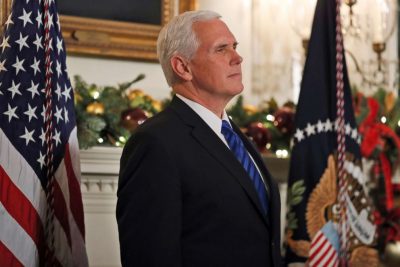US Stresses Interventionist Plan in Cuba, Nicaragua, Venezuela

“We will stay by the side of those who long for freedom and we will confront their oppressors,” Vice President Mike Pence.
Ramping up interventionist rhetoric and policy against progressive governments in the region, United States Vice President Mike Pence said working for “freedom” in Cuba, Nicaragua and Venezuela is a priority for Donald Trump’s administration during a ceremony in which new U.S. ambassador to the Organization of American States (OAS), Carlos Trujillo, was sworn in.
“We will stay by the side of those who long for freedom and we will confront their oppressors,” Pence said during the event in the White House.
During his speech the U.S. vice president singled out Cuba, Nicaragua and Venezuela. Of Cuba he said the island continued to live “under tyrannical legacy,” using terminology and rhetoric used by right-wing Cuban Americans against the communist government of Cuba.
Later it was Nicaragua’s turn. Pence accused Daniel Ortega’s government of “brutally repressing” peaceful protesters, a common allegation used by successive U.S. governments and their western allies to justify interference despite lacking proper evidence to back their claims.
The he attacked the Venezuelan government calling President Nicolas Maduro a “dictator” and charged him with turning “one of South America’s most prosperous countries into one of the poorests.”
Over the years Washington has maintained economic and political attacks against these three countries hoping to bring about regime change.
Since 1960 consecutive U.S. governments have imposed an economic blockade against Cuba. In the 1980s U.S. President Ronald Reagan began financing and training a paramilitary group within Nicaragua known as the Contras. In 2015 the Obama administration declared Venezuela a “threat to its national security” and the policy of economic sanctions and diplomatic isolation was unleashed.
The U.S. Senior Director for Latin America Juan Cruz called Monday for the Venezuelan military to overthrow Maduro under a constitutional provision that justifies rebellion against dictatorial rule.
Juan Cruz, Special Assistant to President Trump and Senior Director for Western Hemisphere Affairs, when asked if the US government supports a military coup in Venezuela. #HSC2018 pic.twitter.com/e915UgxyiN
— Andrei Serbin Pont (@SerbinPont) April 30, 2018
Earlier this year former U.S. Secretary of State Rex Tillerson also hinted at a military coup in Venezuela.
The new U.S. ambassador to the OAS announced Wednesday that the OAS general assembly meeting scheduled for June will include a debate on the situation in Venezuela.
“We can get there with a resolution condemning Venezuela for not accepting basic humanitarian aid. That is the first step,” Trujillo explained.
Maduro has refused to accept international aid because he says he is certain that the economic crisis Venezuela faces has been created by the U.S.-sponsored sanctions that affect all Venezuelans.
Pence is expected to address the OAS permanent council next Monday.

